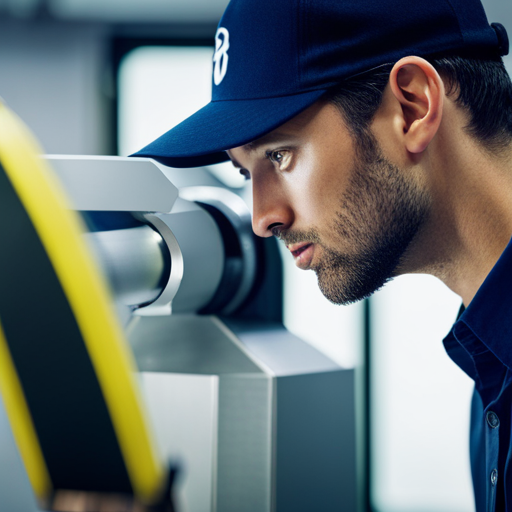
In the ever-evolving landscape of custom manufacturing, the role of 3D scanning has emerged as a pivotal force, revolutionizing the way products are designed, prototyped, and produced. By leveraging advanced scanning technology, manufacturers can now achieve unparalleled precision, efficiency, and customization in their processes.
This article explores the transformative impact of 3D scanning on custom manufacturing, delving into its advantages, applications, and future trends, as it continues to shape the industry’s trajectory.
Advantages of 3D Scanning in Custom Manufacturing
One significant advantage of 3D scanning in custom manufacturing is its ability to capture detailed measurements and dimensions with precision, allowing for accurate replication of complex shapes and designs. This improved precision leads to enhanced quality in the manufacturing process, as it ensures that the final product matches the intended design with utmost accuracy. Additionally, 3D scanning facilitates cost-effective solutions by minimizing errors and rework, ultimately reducing material waste and production time. The technology enables manufacturers to create intricate, customized components and products with minimal margin for error, resulting in improved overall quality while simultaneously optimizing operational costs.
Furthermore, 3D scanning can aid in identifying potential design flaws or areas for improvement, allowing for adjustments to be made early in the production process. This proactive approach not only enhances the quality of the end product but also contributes to cost savings by avoiding the need for extensive rework or redesign. As such, the use of 3D scanning in custom manufacturing offers a compelling combination of precision, efficiency, and cost-effectiveness, making it an invaluable tool in modern production processes.
Transitioning into the subsequent section about ‘applications of 3D scanning technology‘, it is essential to explore how these advantages translate into real-world uses across various industries.
Applications of 3D Scanning Technology
The application of 3D scanning technology across various industries has revolutionized the way custom manufacturing processes are approached. 3D scanning applications have expanded to include reverse engineering, quality control, and rapid prototyping. With technology advancements, 3D scanning has become more precise, faster, and cost-effective.
In manufacturing, 3D scanning plays a crucial role in ensuring the accuracy of the production process by capturing the intricacies of complex parts and components. This technology has significantly impacted manufacturing by reducing lead times, improving product quality, and minimizing errors in custom manufacturing processes.
Furthermore, 3D scanning enhances design efficiency by providing detailed and accurate data for creating custom parts and products. It allows for the seamless integration of scanned data into CAD software, enabling manufacturers to streamline the design process and make necessary adjustments more effectively.
The versatility and adaptability of 3D scanning technology have made it an indispensable tool across various industries, significantly impacting the way custom manufacturing is approached.
The impact of 3D scanning technology on design efficiency will now be discussed in the subsequent section about its impact on design and prototyping.
Impact on Design and Prototyping
The impact of 3D scanning on design and prototyping is significant.
It allows for enhanced design precision by capturing detailed measurements of physical objects and translating them into digital models.
This, in turn, accelerates prototype development and enables iterative design improvements, leading to more efficient and effective custom manufacturing processes.
Enhanced Design Precision
Enhanced design precision resulting from 3D scanning technology significantly impacts the efficiency and accuracy of the design and prototyping processes in custom manufacturing. This advancement enables precision engineering and design optimization, revolutionizing the way products are developed and brought to market.
The following are key ways in which enhanced design precision influences the custom manufacturing process:
- Iterative design improvements can be made rapidly and accurately.
- Complex geometries and intricate details can be captured and replicated with high fidelity.
- Prototyping becomes more cost-effective and efficient, reducing time to market.
- Customization and personalization of products can be achieved with unparalleled accuracy and consistency.
Accelerated Prototype Development
With the ability to rapidly capture and replicate complex geometries and intricate details, 3D scanning technology accelerates prototype development, transforming the design and prototyping processes in custom manufacturing.
This rapid production capability allows for swift iteration and customization of prototypes, leading to reduced time-to-market for new products. Customized solutions can be efficiently developed and tested, enabling manufacturers to respond quickly to customer demands and market trends.
3D scanning not only expedites the initial prototype creation but also facilitates the modification of designs based on real-world testing and feedback. As a result, manufacturers can swiftly implement iterative design improvements, ensuring that final products meet the highest standards of quality and functionality.
Iterative Design Improvements
Iterative design improvements significantly impact the efficiency and precision of the design and prototyping processes in custom manufacturing. Through design iteration, product refinement is enhanced, resulting in superior final products.
The following are key ways in which iterative design improvements influence the design and prototyping processes:
-
Enhanced Precision: Iterative design allows for continuous refinement, leading to precise and accurate product designs.
-
Efficient Prototyping: The iterative approach streamlines the prototyping process, reducing time and costs while ensuring high-quality prototypes.
-
Improved Functionality: Through multiple design iterations, product functionality is optimized, resulting in superior end products.
-
Enhanced Customization: Iterative design improvements enable the customization of products to meet specific client requirements, leading to greater customer satisfaction.
Improving Production Efficiency
3D scanning technology has significantly increased production efficiency in custom manufacturing. By improving accuracy and reducing waste, 3D scanning streamlines the production process. Traditional manufacturing methods often involve a trial-and-error approach, leading to inaccuracies and material wastage.
However, with 3D scanning, precise measurements and detailed digital models allow for the creation of prototypes and final products with minimal margin for error. This level of accuracy ensures that each component fits perfectly within the assembly, reducing the need for rework and adjustments.
Moreover, 3D scanning facilitates the identification of potential issues early in the production stage, preventing costly mistakes and material wastage. By capturing detailed data of the manufacturing environment, 3D scanning enables manufacturers to optimize workflows and minimize resource utilization.
Additionally, the ability to quickly compare scanned objects to digital designs allows for rapid identification and elimination of defects, further reducing waste and production delays.
In essence, the integration of 3D scanning technology in custom manufacturing operations has revolutionized the production process, enhancing accuracy, and minimizing waste, ultimately leading to improved production efficiency.
Quality Control and Inspection
The integration of 3D scanning technology has revolutionized quality control and inspection processes in custom manufacturing, enabling precise and detailed analysis of components for adherence to design specifications.
This advanced technology offers several benefits in quality control and inspection:
-
Enhanced Accuracy: 3D scanning provides a high level of accuracy in measuring and inspecting manufactured components, minimizing the margin of error in quality control processes.
-
Efficiency: The speed and automation of 3D scanning streamline the inspection process, reducing the time required for quality control assessments.
-
Comprehensive Analysis: It allows for the comprehensive analysis of complex geometries, internal structures, and surface deviations, ensuring thorough quality inspections.
-
Documentation and Traceability: 3D scanning facilitates the creation of detailed documentation and traceability records, offering valuable insights into the manufacturing and quality control process.
These technological advancements in quality control and inspection not only improve the overall quality of custom manufacturing but also contribute to greater efficiency and precision in ensuring compliance with design specifications.
Customization and Personalization
Customization and personalization in custom manufacturing play a pivotal role in meeting the unique needs and preferences of individual consumers. As technology continues to advance, customization trends are evolving to offer more tailored products. From personalized engravings to custom-fit designs, manufacturers are leveraging 3D scanning and printing technologies to create products that align with the specific requirements of each customer.
Personalization techniques such as algorithm-driven design modifications and mass customization capabilities are being integrated into the manufacturing process, allowing for greater flexibility and individuality in the products offered to consumers.
Manufacturers are also exploring innovative ways to incorporate personalization into the entire product lifecycle, from design and production to post-purchase experiences. Additionally, advancements in data analytics and artificial intelligence are enabling companies to better understand consumer preferences and behavior, thereby enhancing the personalization of products.
These trends are expected to continue shaping the future of custom manufacturing, driving the industry towards even more sophisticated and personalized offerings that cater to the ever-changing demands of consumers.
Future Trends and Innovations
The future of 3D scanning in custom manufacturing holds significant promise as technology continues to advance at a rapid pace. These advancements are expected to have a profound impact on product design, enabling more intricate and complex designs to be brought to life with greater ease and precision.
Furthermore, the trend towards customization and personalization is likely to be further amplified, as 3D scanning technology empowers manufacturers to create unique and tailor-made products for their customers.
Advancements in 3D Scanning
Manufacturers are continuously exploring innovative ways to enhance 3D scanning technology for future applications in custom manufacturing. The advancements in 3D scanning are poised to have a significant industry impact, with several trends and innovations on the horizon:
-
Enhanced Resolution: Future 3D scanners are expected to provide even higher levels of detail, allowing for more precise and accurate scanning.
-
Improved Speed: Advancements in scanning technology aim to reduce the time required for capturing 3D data, increasing efficiency in the manufacturing process.
-
Integration with AI: The integration of artificial intelligence with 3D scanning is anticipated to streamline data analysis and interpretation, leading to more actionable insights.
-
Portable and Handheld Scanners: The development of more compact and portable 3D scanning devices will enable greater flexibility and accessibility in various manufacturing environments.
These advancements in 3D scanning technology are set to revolutionize custom manufacturing processes, impacting product design, production, and quality control.
Impact on Product Design
An evolution in product design is underway as 3D scanning technology continues to drive innovation and efficiency in custom manufacturing processes.
The impact on manufacturing processes is substantial, with 3D scanning enabling more precise and accurate product design. This technology allows for the optimization of designs, leading to improved functionality and aesthetics while reducing material waste.
Design optimization is now more achievable, as 3D scanning provides detailed insights that facilitate the creation of complex geometries and intricate details that were previously challenging to achieve.
Furthermore, the ability to quickly capture and digitize real-world objects streamlines the design iteration process, accelerating the overall product development timeline.
As manufacturers continue to leverage 3D scanning for product design, future trends and innovations are expected to further enhance design capabilities and ultimately, the quality of custom manufactured products.
Customization and Personalization
Leveraging 3D scanning technology for customization and personalization in custom manufacturing is expected to drive future trends and innovations, enhancing design capabilities and ultimately improving the quality of custom manufactured products.
Customization trends are shifting towards on-demand manufacturing, allowing for more personalized products.
Advanced software algorithms are being developed to interpret 3D scan data and create highly customized designs.
The integration of 3D scanning with virtual reality (VR) and augmented reality (AR) technologies is set to revolutionize the way customers interact with and personalize their products.
Custom manufacturing processes are increasingly focusing on sustainability, using 3D scanning to create products that are tailored to individual needs while minimizing waste.
Frequently Asked Questions
How Does 3D Scanning Technology Impact the Environmental Sustainability of Custom Manufacturing Processes?
3D scanning technology positively impacts the environmental sustainability of custom manufacturing processes by enabling more precise material usage, reduced waste, and efficient production. Sustainable practices are enhanced through minimized environmental footprint and resource conservation.
What Are the Potential Challenges or Limitations of 3D Scanning in Custom Manufacturing?
Potential challenges and technical limitations of 3D scanning in custom manufacturing include accuracy and quality control. Ensuring precise measurements and managing data quality are critical for successful implementation, requiring careful attention to detail and calibration.
Can 3D Scanning Be Used to Reverse Engineer Existing Products for Custom Manufacturing Purposes?
Reverse engineering through 3D scanning enables precise replication of existing products for custom manufacturing. By capturing detailed measurements and geometry, 3D scanning facilitates the creation of accurate digital models that serve as a foundation for customized production processes.
What Are the Cost Implications of Implementing 3D Scanning Technology in Custom Manufacturing Compared to Traditional Methods?
The cost implications of implementing 3D scanning technology in custom manufacturing compared to traditional methods involve initial investment, ongoing maintenance, and workforce training. Technology adoption may bring efficiency gains, but challenges in implementation should be carefully considered.
How Does 3D Scanning Technology Affect the Skills and Training Required for Workers in the Custom Manufacturing Industry?
The impact of 3D scanning technology on workforce training in custom manufacturing is significant. Its integration requires upskilling employees to operate and maintain the equipment effectively. This is essential for the industry’s sustainability and competitiveness.
Conclusion
In conclusion, 3D scanning plays a crucial role in custom manufacturing by improving production efficiency, quality control, and customization.
According to a study by Grand View Research, the global 3D scanning market is projected to reach $8.04 billion by 2025, driven by the increasing demand for customized products and the adoption of advanced manufacturing technologies.
As technology continues to advance, 3D scanning will continue to revolutionize the manufacturing industry.

Lettie Kostohryz is a passionate writer and technology enthusiast, specializing in the realm of 3D scanning. With a keen interest in innovative solutions that bridge the physical and digital worlds, Lettie explores the intricacies of 3D scanning technology on her website, faxow.com. Through insightful articles and expert commentary, she demystifies the world of 3D scanners, unraveling their applications across industries and showcasing their transformative impact on design, manufacturing, and beyond. Lettie’s commitment to unraveling the complexities of 3D scanning makes her a valuable resource for those eager to explore the cutting edge of digital imaging.

Leave a Reply